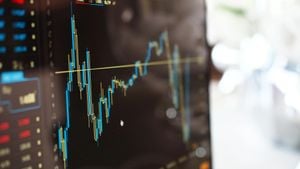On February 23, 2025, voters across Germany marked the occasion with excitement as they headed to the polls for the much-anticipated Bundestag elections. Interest was especially heightened within Baden-Württemberg, where party dynamics shifted dramatically, culminating in significant electoral outcomes. The results of election day revealed high voter engagement and pivotal victories for key parties.
The electoral atmosphere altered as the latest projections emerged, showcasing the CDU (Christian Democratic Union) taking the lead with approximately 31.5% of the vote, compared dominantly to 19.9% for the AfD (Alternative for Germany). The SPD (Social Democratic Party) garnered 14.3%, closely followed by the Greens at 13.5%, and the Left Party experienced modest support with around 6.8%.
This year's elections witnessed more than just numerical shifts; they underscored the contentious political climate post-Ampel coalition collapse, which occurred during the previous year. A significant rise of 36.5% turned out on election day, improving upon the turnout of just 23.27% from the 2021 elections, marking this round as one of the most engaged votes seen yet.
Highlights from local election races were especially notable. For example, Alice Weidel, the AfD's prominent figure and leading candidate at the Bodensee, could not secure the majority, achieving just 20.4% of the votes—a stark defeat to the CDU candidate Volker Mayer-Lay, who claimed nearly 40%. Regardless, Weidel's parliamentary future remains intact through the party list.
Simultaneously, key candidates experienced their own successes and disappointments reflected within various district races. For voice and representation, Melis Sekmen of the CDU narrowly managed to win her constituency with 24.7% against SPD's Isabel Cademartori Dujisin, who received 22.5%. The competition remained heated, as third and fourth place candidates such as Nina Wellenreuther (Greens) and Heinrich Koch (AfD) turned up with 18.1% and 17.9%, respectively.
Many leading figures from the political sphere weighed on the outcomes. CDU Landeschef Manuel Hagel remarked about the results, claiming their standing was validation of the public’s trust, emphasizing the need for stable governance moving forward. He noted, “We are seen as the leading force now, and we hold the creative power to reshape policies effectively.”
Conversely, the SPD's reaction was more somber. Party leader Saskia Esken experienced disappointment within her electoral district, where she only logged 12.6% of votes—a notable setback compared to her previous 16.8%. Esken interpreted the decline as reflective of the party’s need to reevaluate its core messaging on key issues, particularly focusing more on public repercussion stemming from migration and economic conditions. She addressed this post-election, stating, "We need to place our central themes back at the fore of our campaigns and reconnect with voter priorities. This is only the beginning of our adjustment process."
Political analysts were quick to comment on how new voter trends might alter the political visage across the nation. The rising prominence of the AfD has been both alarming and noteworthy, as they now hold considerable ground especially within regions traditionally dominated by CDU and SPD. Observers noted, “The AfD has made substantial strides this election, indicating growing support for their platform at the heart of voter concerns.”
An shifting conversation point was the potential coalition government. With the CDU's leadership role being fortified, questions arose about their coalition preferences moving forward. Friedrich Merz (CDU), positioned as the likely new Chancellor, stated, "Coalition-building will take diligent consideration and responsiveness to the public voice post-elections. A stable coalition centered on stability and governance is now imperative.”
Meanwhile, the electoral outcomes were not without repercussions for several parties. The FDP's struggle was evident as they fell below the 5% threshold necessary to enter the Bundestag, garnering only around 4.4%. They faced substantial internal debates on how they would navigate the post-election environment to rebuild relevance.
Beyond individual party statements and scenarios, broader topics surrounding voter sentiments remained imperative. The debate on migration, economic stability, and climate action echoed through party platforms of the successful candidates, thereby shedding light on what voters deem as priorities leading up to the elections. Voter feedback indicates significant concern over safety and economic security as top motivating topics during the voting process.
The aftermath of the elections is poised to set the stage not only for the future government structures but for upcoming land elections as well, highlighting the need for parties to confront rising public sentiment head-on. Boris Palmer weighed the broader ramifications of the election outcomes, emphasizing, “This is not just about this election; it sets the tone for our immediate political direction as we proceed to address pressing issues on the national agenda.”
With all votes tallied and coalitions likely forming over the next few days, Baden-Württemberg’s recent embarrassing hurdles amid political tensions underline the potential reshaping of Germany’s national identity, offering fresh debates around political engagement and accountability.



